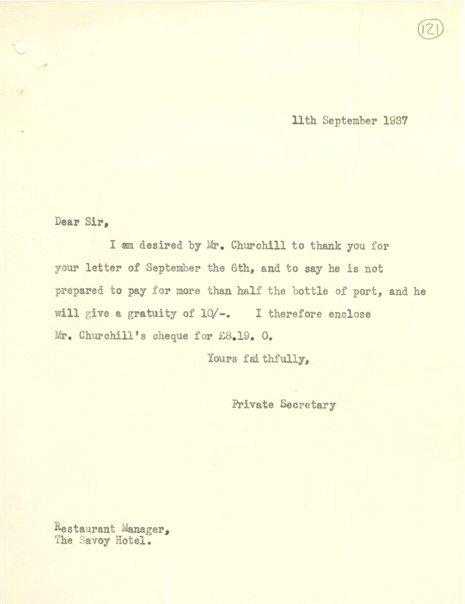Read Dinner With Churchill: Policy-Making at the Dinner Table Online
Authors: Cita Stelzer
Tags: #General, #Biography & Autobiography, #Military, #History, #World War II, #20th Century, #Europe, #World, #International Relations, #Historical, #Political Science, #Great Britain, #Modern, #Cooking, #Entertaining
Dinner With Churchill: Policy-Making at the Dinner Table (4 page)


Randolph’s 21st birthday, 1932
Churchill was sensitive to the needs of his guests, in this case Baruch’s need for privacy. So when
The New York Times
requested permission to photograph the guests on the night, Churchill refused.
28
In the early 1930s, Churchill wrote a letter to
The Times
protesting at the habit that was then developing of taking photographs at banquets while people were eating. He felt strongly that this was an intrusion, and that photographs should be taken only at the start of the formal proceedings.
29
Protecting his guests’ privacy was just one example of Churchill’s careful discharge of his duties as host. One guest described him as a “meticulous host. He would watch
everyone
all the time to see whether or not they wanted anything”.
30
Another commented:
It is a marvel how much time he gives to his guests … He is an exceedingly kind and generous host, providing unlimited champagne, cigars and brandy.
31
And still another, Anthony Montague Browne, described Churchill “as a generous and entertaining host and dinners with him always fun and gastronomically agreeable”.
32
Joan Bright, who throughout the Second World War organised overseas travel for Churchill and the Chiefs of
Staff, said he had lovely manners.
34
Do not confuse his meticulous attention to details for dinner parties with any culinary skills, his claims to the contrary notwithstanding. Once, when Chartwell was closed, and Mrs. Churchill told him it would be impossible to spend the weekend there because there was no one to cook for him, he replied: “I shall cook for myself. I can boil an egg. I’ve seen it done.”
33
Brave talk. Lady Williams told me that Churchill “certainly never, to my knowledge, looked at a grill or could boil a kettle”. Churchill was interested in dining not in cooking. And this despite his determination to acquire other practical skills like bricklaying.
Churchill was certainly aware that his talents were shown to best advantage on a carefully set stage. In 1929 he wrote to his wife from Santa Barbara, California, where he had been visiting Hearst:
I am v. glad you are taking Venetia’s [Montagu] house for the session. Do not hesitate to engage one or two extra servants. Now that we are in opposition we must gather colleagues and MPs together a little at luncheon & dinner. Also I have now a few business people who are of importance. We ought to be able to have luncheons of 8–10 often & dinners of the same size about twice a week. You shd have a staff equal to this.
35
In 1922 Churchill had bought Chartwell, a country house in the county of Kent, within easy driving distance of London. It required a considerable amount of renovation, which he supervised, and some of which he carried out “with the same meticulous obsession he gave to his speeches”.
36
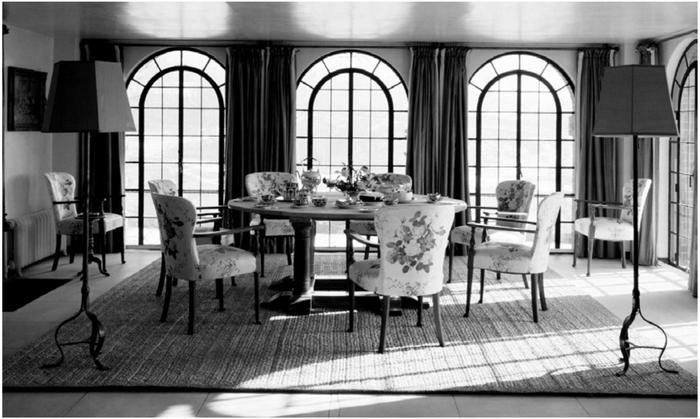
Churchill’s favourite stage: the dining room at Chartwell
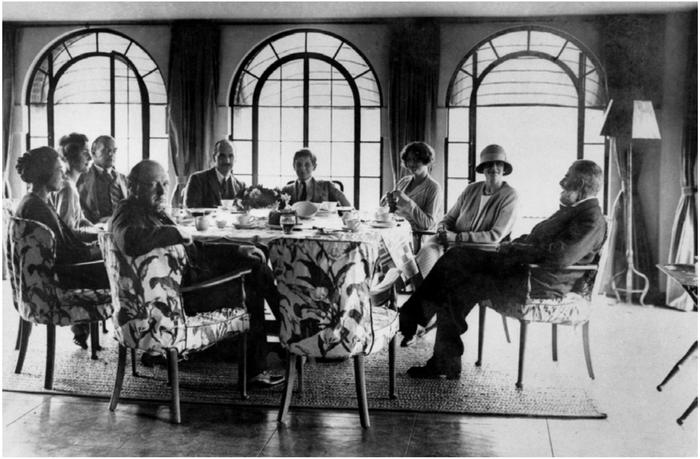
Dining at Chartwell, 1928
Perhaps aware of the effect of the low ceiling in the dining room, to which he paid particular attention, Churchill
specified
floor-length windows and doors on three sides of the almost-square room to give it an open feeling. He directed to his wife a Dissertation on Dining Room Chairs:
The Dining Room chair has certain marked requisites. First, it should be comfortable and give support to the body when sitting up straight; it should certainly have arms which are an enormous comfort when sitting at meals … One does not want the Dining Room chair spreading itself, or its legs, or its arms as if it were a plant … this enables the chairs to be put close together if need be, which is often more sociable …
37
The fun goes on. His wife answered that she had “digested his Dissertation”.
Today, under the care of the National Trust, Chartwell remains much as it was during Churchill’s time, with
white-flowered
chintz on comfortable armchairs around a great round table in the dining room: round to ease conversation and create a sense of equality, no opposing sides, nor
corners
, no one below the salt.
Two months before Churchill left for the Potsdam Conference and before the 1945 election, his cousin, Clare Sheridan, needing money, wrote to him offering to sell him her mother’s set of Napoleon’s special china. Clare’s mother was Lady Randolph’s sister, Clara. Clare thought the Prime Minister ought to have the china “on account of its family association … Before the Tuilleries [sic] were burnt [1871], the Commune sold at auction the contents! And our dear
grandmother Jerome was there, bless her, and bid on the Tuilleries [sic] lawns for the china”.
38
Thomas Goode appraised the china and Clare attached the listing for Churchill’s consideration. Always considerate of family, Churchill sent her a cheque for more than the amount requested. The large set (38 dinner plates!) is white Sèvres china, gold-rimmed, with a large gold N below a crown – “the same monogram on chiffre as that of the first Napoleon”.
39
I am told that Churchill used this china at Chartwell, where it is on display today.
Attention to detail remained the order of the day at Chartwell even after its completion. For a garden party on Saturday 21 July 1934, the marquee was to be lined in olive green and lemon,
40
and to accommodate some 250 guests, “all sitting at one time” according to the caterer’s notes. The menu was predictably lavish, and equally
predictably
, the musical selections reflected Churchill’s preference for Gilbert and Sullivan – selections from HMS
Pinafore, The Gondoliers
, and
Iolanthe
. And a bit of Clementine
caution
– insurance against rain, with the pay-out a function of the amount of rainfall: reportedly 30% of the insured amount for .5 inches of rain, up to 100% if .15 inches fell. It did not rain.
41
Nothing was more important to Churchill than the seating arrangements at his dinners, as we shall see when
describing
the Big Three dinners in Teheran, Yalta and Potsdam. He personally undertook this chore, which other politicians usually left to diplomatic wives or officials, reflecting yet another lesson learned from his mother, the widely acclaimed society hostess. She carefully seated strangers and, often, people who were not friendly, next to each other at her
dinner parties, calling them the “dinner of deadly enemies”.
42
Churchill said of his mother that “In my interest she left no wire unpulled, no stone unturned and no cutlet uncooked.”
43
As a young man, he once sent her a letter of New Year’s
wishes
, with a sketch of her holding a menu.
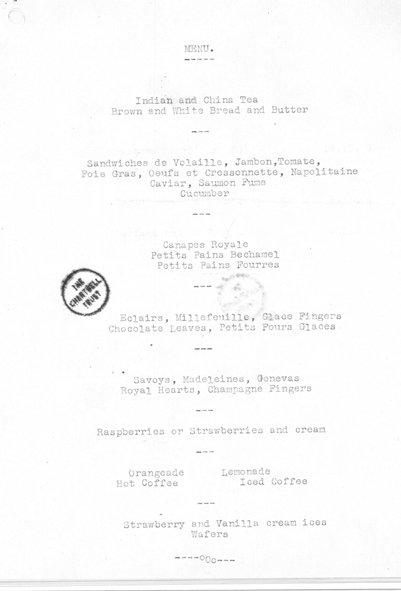
Chartwell garden party and Mrs. Churchill’s prudence
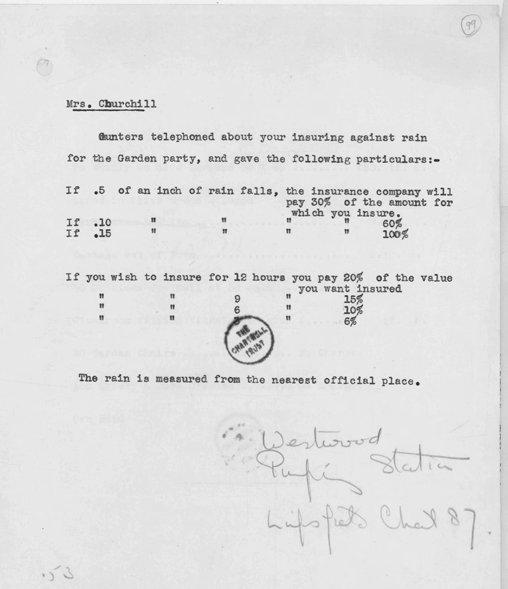
President Eisenhower, interviewed years later, remarked on the great attention Churchill paid to correct placement at dinners. He said Churchill always put him on his right at the table, explaining: “anybody who held a commission from two countries outranked anyone who had a
commission
from one”. Only once did this change. Churchill rang him to explain that he would have to sit on his left as
My old friend Field Marshal Smuts is to dinner with us this evening. Won’t you give up your place on my right and take a place on my left?
44
Detailed attention extended to costs. Churchill quite
regularly
questioned bills received from Claridge’s and the Savoy,
45
but was always careful to reward staff at such venues, for example adding £3 to the bills for his dinner for Baruch and again for a dinner for sixteen at Claridge’s on 30 January 1935, for which the manager thanked Churchill profusely.
46
In one letter, Churchill thanks the Savoy Hotel manager for sending back his opera hat which he had left at the hotel. He then complains that the charge included a full bottle of port, whereas only one half was consumed, and requests the details on the charges for cigars and cigarettes.
47
The
manager
responds fully, giving details of the expenses: no
cigarettes
were consumed and the bill was adjusted, but the eight cigars, two of which were taken away by Churchill’s son, are listed and named.
